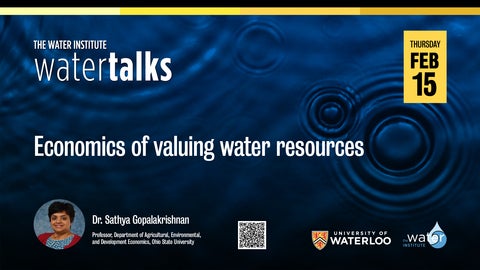
As part of the Water Institute's WaterTalks lecture series, Dr. Sathya Gopalakrishnan, Professor, Department of Agricultural, Environmental, and Development Economics, Ohio State University, will present: Economics of valuing water resources.
This event is in person in TC 2218 with a lunch reception to follow.
Water quality within a watershed is strongly linked to human behaviour. Individual agents, through land use decisions driven primarily by economic forces, impact water quality often with negative consequences that reduce the value of the water resource to downstream users (eg. recreational and drinking water). The impact of changes in water quality and ecosystem services provided by rivers, streams and lakes are reflected in real estate markets and recreational choices. In in Water Talk, we will discuss how the economic value of amenities and costs of damages from changes in water quality and ecosystem risks, at least partly, capitalized in related markets, can be estimated, and used to inform policies for sustainable water management.
Sathya Gopalakrishnan is a Professor in the Department of Agricultural, Environmental and Development Economics (AEDE) in the College of Food, Agricultural, and Environmental Sciences (CFAES) at The Ohio State University. She also serves on the faculty of the Environmental Science Graduate Program (ESGP) and is a founding member and former Director of the STEAM Factory – a diverse and inclusive grassroots faculty network within the Ohio State community committed to interdisciplinary research, community engagement, and education. She completed her Ph.D. in Environmental Economics and Policy from Duke University in 2010 and joined the AEDE faculty in 2011.
Climate-change impacts are among the most serious and complex challenges facing society. Climate adaptation presents a grand challenge for resource and environmental economists, requiring interdisciplinary modeling and empirical analysis from disparate sub-fields to inform policy. Sathya’s research is motivated by an interest in applying economic theory to understand ubiquitous interdependencies between human decisions and geophysical processes in complex resource systems. She works on developing coupled models of complex human and natural systems, applied to coastal and water resources; non-market valuation of environmental amenities and risks; and resource management problems in which environmental and economic systems are linked by spatial-dynamic processes. Her research is published in journals in applied economics (e.g., Review of Environmental Economics and Policy, Journal of Environmental Economics and Management, American Journal of Agricultural Economics, Land Economics) and in interdisciplinary journals with broad scientific reach (e.g., Climatic Change, Conservation Letters, Journal of Geophysical Research), and has been supported with over $2.5 million in total funding through national and state agencies. She serves as an associate editor for the flagship journal of the association of agricultural and applied economics, American Journal of Agricultural Economics, an inaugural area editor of the Journal of the Association of Agricultural and Applied Economics (JAAEA), and an elected member of the board of directors of the Association of Environmental and Resource Economists (AERE).